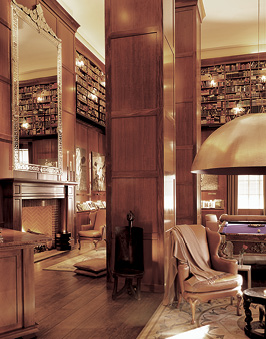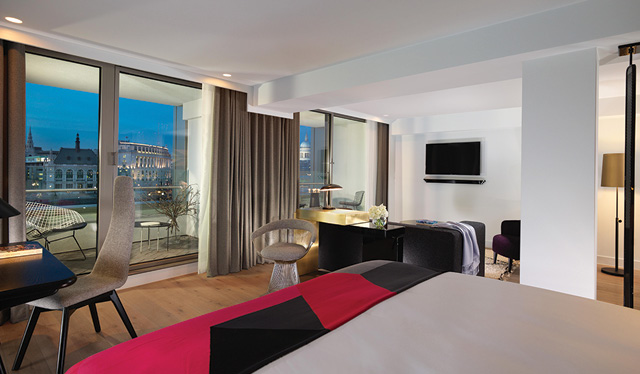- Home
- Media Kit
- Current Issue
- Past Issues
- Ad Specs-Submission
- Ad Print Settings
- Reprints (PDF)
- Photo Specifications (PDF)
- Contact Us

![]()
ONLINE

Hotels for Creators
Editors’ Note
Alan Philips is the Chief Marketing Officer for Morgans Hotel Group, where he oversees the conceptualization, marketing, and development of boutique hotels and their associated brands in the U.S., Europe, the Caribbean, and Middle East. In this position his responsibilities also include the development, launch, and oversight of Morgan’s global food & beverage management business. For the first 15 years of his career, Alan Philips was a hospitality entrepreneur and marketing expert operating his own businesses, Guerrilla Culinary Brigade & SKY Group. Philips attended Cornell University’s School of Hotel Administration, earning a degree with a concentration in Food and Beverage Management. Philips first job in the hospitality world was with celebrity chef Wolfgang Puck at the original Spago Restaurant on Sunset Boulevard. He also maintained positions with Myriad Restaurant Group (NOBU, Tribeca Grill) and Strategic Group (Tao, Marquee, Lavo). In 2001, he launched his own hospitality marketing and consulting firm. In 2011, he launched two restaurants, CO-OP Food & Drink and Viktor & Spoils, and took over management of all food, beverage, and catering for the Hotel on Rivington. He recently published his first book, The Complete Idiot’s Guide to Starting a Food Truck Business.
Company Brief
Morgans Hotel Group (morganshotelgroup.com) is widely credited as the creator of the first “boutique” hotel and a continuing leader of the hotel industry’s boutique sector. Morgans Hotel Group operates Delano in South Beach and Marrakech; Mondrian in Los Angeles, South Beach, and New York; Hudson, Morgans, and Royalton in New York; Shore Club in South Beach; Clift in San Francisco; and Sanderson and St Martins Lane in London. Morgans Hotel Group has ownership interests or wholly owns several of these hotels. Morgans Hotel Group has other property transactions in various stages of completion, including Delano properties in Las Vegas, Nevada; Cesme, Turkey; Moscow, Russia; and Cartagena, Colombia, and Mondrian properties in London, England; Istanbul, Turkey; Doha, Qatar; and Baha Mar in Nassau, The Bahamas, as well as a Hudson in London, England. Morgans Hotel Group also owns a 90 percent controlling interest in The Light Group, a leading lifestyle food and beverage company.
What excited you about the opportunity to join this company and made you feel it would be the right fit?
I like to work on things that I feel passionate about, and I am very passionate about this brand and these hotels. I had seen it, I had studied it, I had consumed it, and I had enjoyed it.
Walking into Delano the first time was a life-altering experience for me, and understanding and becoming a part of the way that experience was built excited me.
So when the opportunity came along, I was intrigued.
The second part of my interest is that despite the company as a whole being an amazing and innovative organization, it had hit on some hard times, and I pride myself on being a fixer specializing in start-ups and turn-arounds.

The library at the Hudson, New York
What is the profile of a Morgans customer?
We talk about our customer as the creative class and that market is exploding.
We cater to the creative community, the leaders in creative disciplines and to those who aspire to be like or around those people which, in the modern market is 8 out of every 10 people. There has been such a surge in lifestyle hospitality in the past decade because so many people want to be a part of the creative lifestyle. A lot of people want creativity, innovation, and excitement in their lives.
Is it more important to link the Morgans Hotel name and build additional brand awareness for the group or is the individual property awareness more valuable?
The awareness of the specific brands is what’s important for the growth of the overall business, but awareness of our iconic properties and making sure they are highly profitable is what’s important for today, for now.
The tie that binds all of these properties together is that they’re all iconic.
It’s about creating an environment that allows people to lose themselves, and where they are inspired to exercise their creativity. We develop hotels for creators and we are the creators of the segment, so we have history that other people in this segment don’t have. Owning that history is crucial as the market becomes more saturated.
What’s the secret to success in the food and beverage component?
Our business of food and beverage is treated like it’s own business. We don’t look at a hotel as having rooms with a little bar on the side. We say we have a bar and we’re going to dedicate bodies to filling it and running it well, and we’re going to leverage that food and beverage experience to sell hotel rooms.
Also, it’s really important for food and beverage to be an innovative marketing tool for the hotel. From a marketing perspective, what people tend to have a problem with today is looking at things holistically. The successful marketers of the future are the ones who market from an integrated matter, which means they can create content and push that content out over multiple channels. All the channels have to be speaking the same language and reinforcing the same message, and that has to begin with really good content. Today, people want to share their food and beverage experiences, so food and beverage has to be used as a way to leverage the overall sales proposition.

A river view balcony suite at Mondrian London
How big can this company get and, in doing so, is it important you don’t lose the intimate feel?
We have to grow because we’re a publicly traded company, and generally if you’re not growing, you’re dying. We have to put a strategy in place and execute our value proposition without screwing up. We have to do the creative part of that with a core group of people and it can’t be democratized – decision by committee doesn’t work.
Our properties are a platform for creative people and creative ideas to be exposed, and the business is the engine that drives them. But the business is made up of people, who are inherently imperfect, and when people feel passionate and have personal choice it goes a long way toward making the business proposition work.
What is the role of a CMO today?
I see myself as a Chief Creative Officer, who happens to be a pretty good entrepreneur. The CMO is an interesting role and it’s evolving in ways that people haven’t seen before, because there are no sales without marketing and no marketing without sales. The methods of marketing and putting your product out there are changing at such a rapid pace that I almost feel like we produce content and we put it out there through an ever-changing variety of channels and if people like that content, they come.
I also have to be a lot more data driven than I was in the past. I can have a real advantage if I understand the data. So it’s an unusual juxtaposition to be able to understand data and also be creative. That is my biggest challenge.•